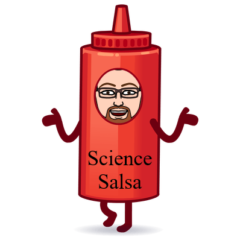
There are times when reform is necessary. The very successful STEM graduate education programs in USA are now graduating a lot more PhDs, but the number of Faculty positions is not increasing accordingly. This has generated a new reality for young scientists: Six of every seven PhDs will not get an academic Faculty position and will need to find a job elsewhere.
After seven years as a graduate student plus three years as a postdoc, I found myself facing that new reality. At the time, I was sad watching my career as an independent researcher stopping after years of hard work, but I was very excited to watch new horizons opening. Deciding to become a professional science communicator came with the realization that –except from some past volunteer work– I was poorly prepared to be an effective communicator for a general audience.
If you have read my blog in the past, you know that I have done efforts to improve my communication skills; taking online classes, attending the Engage Science seminar series at University of Washington, and learning from the ScienceOnline community. Still, I wonder if it would have been better just to have more science communication training when I was in graduate school. There is clearly a need for scientist that can tell their research in public, why don’t we do more communication training in graduate school?
Turns out that there are graduate programs that offer communication training for STEM students, and grassroots efforts from graduate students too. I knew of a couple of them, doing amazing work to train young scientists. But then I hear about GradSciComm, and realized the effort to reform graduate education is widespread.
What is GradSciComm?
GradSciComm is an effort leaded by COMPASS to “assess the current landscape of communication trainings available to graduate students in the STEM disciplines”, but it goes beyond that. The idea is to build a roadmap for graduate education reform. From COMPASS blog:
“Reforming graduate education is grand challenge, but it’s a movement with serious momentum behind it. Federal agencies, professional societies, and graduate-led efforts are hard at work, including the National Institutes of Health, Council of Graduate Schools, American Chemical Society, and the National Science Foundation Graduate Education Modernization Challenge, to name a few. The need for better professional skills training comes up in nearly every conversation. And improved communication skills is just one among many needs.” Erica Goldman and Liz Neeley.
Part of the GradSciComm effort was to learn what communication training was already done, to start a conversation based on the current landscape. Last week, on December 5th and 6th at the National Academy of Sciences building in Washington, D.C., “four COMPASS staff –Nancy Baron, Brooke Smith, Erica Goldman, and Liz Neeley – ” facilitated a discussion “among a select group of scholars, trainers, funders, institutional leaders, and graduate students as they consider the results of our work to date and wrestle with where we go from here.”
The conversations were not recorded to encourage frank discussion, but the slides from presentations are available here: (Day1 , Day2 ) and Twitter discussion was very fruitful (public quotes did not name speaker). I made a Storify of the discussion so people can have access to it. Here is the links for Day1 and Day2 on Twitter.
I know the public discussion on Twitter is incomplete by necessity, and I am looking forward for more coming from COMPASS soon, but I recommend you check the archive of Tweets to give you an idea of how many possibilities and challenges face the graduate education reform in the area of communication. Here I leave you with only four of the tweets that came from #Gradscicomm, I hope this inspires you to join the discussion:
Key competencies in #GradSciComm: listening, dialogue, building trust, distilling complex topics, audience consideration, storytelling
— Jessica Rohde (@RockyRohde) December 5, 2013
Proficiency in #scicomm skills requires: 1) training, 2) practice, and 3) feedback #gradscicomm Practice *doesn’t* make perfect otherwise
— LizNeeley (@LizNeeley) December 5, 2013
Our vision for society: trust in science, science literacy, scientist as desirable career, better informed public policy #gradscicomm
— Jessica Rohde (@RockyRohde) December 6, 2013
Our vision for #GradSciComm: communication part of fabric of grad edu, institutions offer support, shared understanding of best practices
— Jessica Rohde (@RockyRohde) December 6, 2013
What do you think? Do you agree with those ideas? Would you like to talk about your personal experience? Join the discussion in the comments or in Twiter using #GradSciComm. Thanks!
———————————————————–
[View the story “#gradscicomm: the current landscape of communication trainings available to graduate students in the STEM disciplines” on Storify]
———————————————————–
